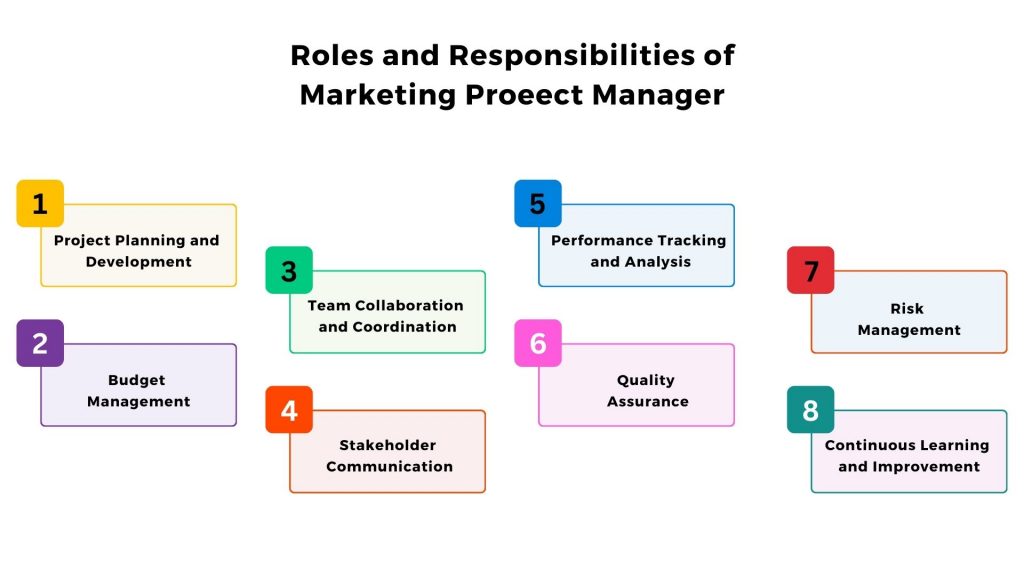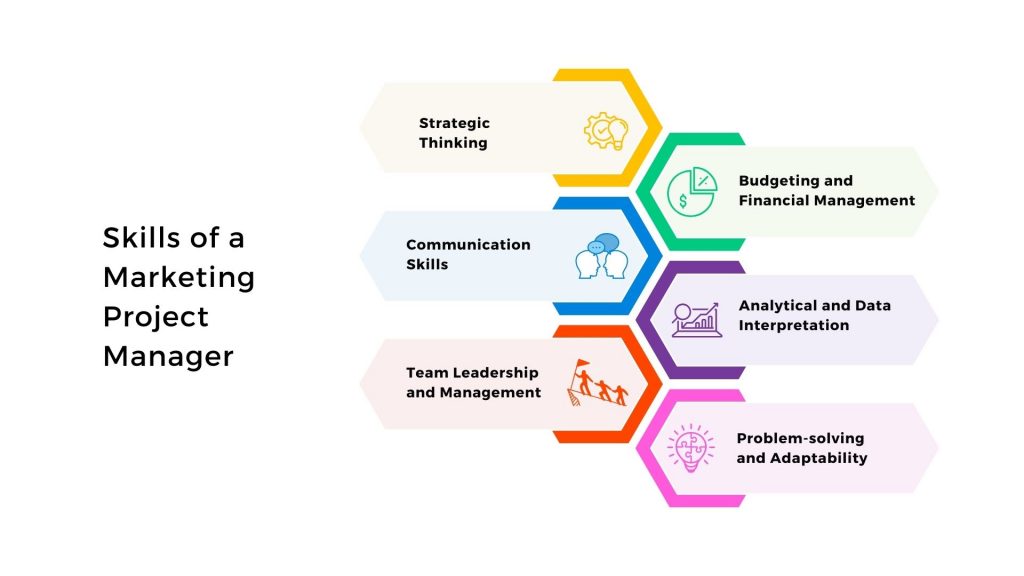
Navigating the bustling streets of the marketing world can often feel like being in a maze. Every turn holds a new challenge, every pathway a different strategy. At the heart of this intricate web, ensuring that every piece falls into place, is the Marketing Project Manager. But what exactly do they do? How do they balance creativity with timelines or strategy with execution?
This article we will explore the details of the marketing project manager, roles and responsibilities, skills, and tools.
Who is a Marketing Project Manager?
The role of a Marketing Project Manager is crucial. They bring structure and organization to marketing campaigns and drive efficiency and effectiveness. Their strategic oversight ensures that marketing efforts resonate with target audiences and deliver a substantial return on investment.
A Marketing Project Manager is a professional overseeing and managing marketing projects from inception to completion. They act as a bridge between the creative and strategy teams, ensuring that all marketing initiatives align with the business’s goals and objectives. Their expertise in project management ensures that campaigns are delivered on time and within scope and budget.
These professionals typically collaborate with various internal teams to bring a marketing project to life, including design, content, digital, and more. They create detailed project plans, allocate resources efficiently, set deadlines, and track project performance, all while ensuring the project’s objectives are met. Furthermore, they often play a pivotal role in stakeholder communication, ensuring all parties are informed and aligned.
What Does a Marketing Project Manager Do? Roles and Responsibilities
A Marketing project manager is at the heart of orchestrating and executing marketing projects, serving as a critical link between strategy formulation and its tangible implementation. They begin by understanding the scope and objectives of a marketing project, laying down detailed plans, allocating resources, and setting clear milestones.
Financial stewardship is another cornerstone of their role, ensuring that each project remains within its budgetary constraints while maximizing impact. They seamlessly integrate various departments, from design to digital to sales, fostering a collaborative environment and ensuring all teams synchronize toward a common goal.
Beyond the planning and collaboration, these professionals are deeply entrenched in performance evaluation and quality assurance. They monitor campaigns against set KPIs, using insights derived from analytics tools to assess the efficacy of marketing efforts and ensure that every deliverable meets the organization’s quality benchmarks. Additionally, they maintain open communication channels with stakeholders, updating them about project progress, challenges, and outcomes.
Project Planning and Development
A Marketing project manager begins with the groundwork, outlining the scope and objectives of the marketing project. They design comprehensive project plans, set timelines and milestones, and ensure the appropriate allocation of tasks to team members, guaranteeing a structured approach from the get-go.
Budget Management
Financial oversight is crucial. These managers are tasked with estimating and setting budgets for particular marketing initiatives. Throughout a campaign, they actively monitor project expenses, ensure alignment with the set budget, and make recommendations or adjustments if any financial concerns arise.
Team Collaboration and Coordination
Acting as the nexus between various departments, the marketing project manager ensures all facets of the team, from design to sales, move in a unified direction. They foster open communication, ensure alignment, and swiftly address internal challenges or conflicts to maintain harmony and productivity.
Stakeholder Communication
Regular and transparent communication with stakeholders is paramount. These managers provide timely updates on project statuses, elicit feedback, and ensure that concerns or recommendations from internal and external stakeholders are aptly addressed.
Performance Tracking and Analysis
It’s not just about execution but also about evaluation. Marketing project managers keenly monitor campaign progress, comparing outcomes with predetermined KPIs. They utilize various analytics tools to gauge the efficacy of marketing efforts, ensuring that data-driven insights shape future initiatives.
Quality Assurance
Ensuring excellence in deliverables, these managers have a vigilant eye for quality. They oversee the outputs, ensure alignment with the project’s objectives, and mandate revisions or edits to uphold the organization’s standards.
Risk Management
Every project comes with its set of potential pitfalls. Identifying these risks early on, marketing project managers craft strategies to circumvent or mitigate these challenges, ensuring that projects remain on course and meet their objectives.
Continuous Learning and Improvement
The dynamic world of marketing necessitates continuous learning. Staying abreast of the latest in both project management and marketing trends, these professionals often engage in workshops, courses, and other opportunities to refine their skills and bring fresh perspectives to their roles.
What Skills are Important for a Marketing Project Manager?
A marketing project manager is a multi-skilled professional who deftly navigates complex campaigns’ intricacies. They harmoniously merge the art of marketing with the science of structured project management, ensuring visions transform into actionable and successful campaigns.
-
Strategic Thinking
A clear understanding of market dynamics, consumer behavior, and the company’s strategic direction is essential to align marketing campaigns with business goals. This skill ensures that all marketing projects have a purpose and direction.
-
Organizational Abilities
Given the multi-faceted nature of marketing projects, having strong organizational skills is crucial. This includes timeline development, resource allocation, and task prioritization to ensure timely and efficient project completion.
-
Budgeting and Financial Management
A keen sense of budgetary oversight ensures that projects stay within their financial constraints. This skill involves estimating costs, tracking expenses, and making necessary adjustments to keep projects within budget.
-
Communication Skills
Effective communication is paramount, given the need to liaise between various departments, stakeholders, and external partners. It is a critical skill that is included in a marketing project manager job description to convey ideas, listen actively, and facilitate open dialogue.
-
Analytical and Data Interpretation
With the increasing emphasis on data-driven decision-making, understanding and interpreting marketing metrics, utilizing analytics tools, and drawing insights from data is essential.
-
Team Leadership and Management
As the person steering the project, they must inspire, lead, and manage diverse teams. This requires interpersonal skills, conflict resolution abilities, and a knack for team motivation.
-
Problem-solving and Adaptability
Like all ventures, marketing projects can encounter unforeseen challenges. A proactive approach to problem-solving and the adaptability to pivot when necessary ensures that projects remain on track.
-
Knowledge of Marketing Trends and Tools
Staying updated with the latest marketing techniques, tools, and technologies is vital. This ensures that projects are contemporary, relevant, and effective.
What Experience is Needed to Become a Marketing Project Manager?
To excel as a marketing project manager, a combination of formal education, practical experience, and certification can significantly enhance one’s expertise and credibility. Here’s a breakdown of the essential qualifications and experience required for this role:
Educational Background
- Bachelor’s Degree: Most hiring entities prioritize candidates with a bachelor’s degree in marketing, communication, business, management, or closely related fields. Specific coursework in marketing is seen as crucial, equipping candidates with foundational knowledge relevant to the role.
- Advanced Degrees: For those aspiring for leadership or specialized roles, a master’s degree in project management can be beneficial. This advanced study offers deeper insights into project management and can distinguish a candidate in the competitive job market.
Practical Experience
- Digital Familiarity: In today’s digital age, experience with online platforms, website content management systems, and various marketing tools is indispensable.
- Project Management Practice: Prior exposure to project management theories and best practices is crucial. This ensures the candidate can seamlessly step into the role and manage projects efficiently.
- Skills Development: Over time, successful marketing project managers cultivate excellent organizational, prioritization, and decision-making skills. Their strong analytical capabilities and robust communication, interpersonal, and leadership skills set them apart.
Certifications
- Project Management Professional (PMP): Provided by the Project Management Institute, the PMP Certification is among the most recognized certifications, validating the holder’s expertise in project management.
- Other Notable Certifications: Depending on one’s interest and career trajectory, various other certifications can bolster one’s profile, including:
- Associate in Project Management
- Certified Associate in Project Management (CAPM)
- Certified Project Director (CPD)
- Certified Project Manager (IAPM)
- Certified ScrumMaster (CSM)
- CompTIA Project+ certification
- PRINCE2 Foundation/PRINCE2 Practitioner
- Master Project Manager (MPM)
- Professional in Project Management (PPM)
Becoming a marketing project manager involves a mix of the right academic qualifications, hands-on experience in relevant domains, and specialized certifications. This amalgamation ensures that one is well-equipped to navigate the multifaceted world of marketing project management.
What Tools do Marketing Project Managers Use?
Marketing project managers rely on many tools to streamline their tasks, track progress, and enhance the overall efficiency of marketing campaigns. These tools often span various domains, from project management to analytics.
Here are some of the most commonly used tools
Project Management and Collaboration
- Trello: A visual task management tool that uses boards, lists, and cards to organize tasks and collaborate with teams
- Asana: A robust project management tool that helps teams coordinate and manage their work
- Slack: A communication platform that facilitates team discussions, direct messaging, and file sharing
- Basecamp: An all-in-one project management and team collaboration tool with features like to-do lists, milestone tracking, and file sharing
Time Tracking and Productivity
- Harvest: A time-tracking tool that helps teams log their hours and generate invoices
- Todoist: A task management app that assists in prioritizing and organizing tasks for the day or week
Document and File Management
- Google Workspace: A suite of productivity tools, including Google Docs, Sheets, and Slides, allows for real-time collaboration and sharing
- Dropbox: A cloud-based storage solution that ensures all essential files are accessible to team members
Marketing Analytics
- Google Analytics: Provides insights into website traffic, user behavior, and various other metrics crucial for assessing the performance of online marketing campaigns
- SEMrush: A comprehensive tool for SEO and SEM analysis, providing data on keywords, competitors, and overall website performance
Campaign Management and Automation
- HubSpot: An all-in-one inbound marketing, sales, and CRM suite, aiding in email marketing, lead tracking, and overall campaign management
- Mailchimp: A widely-used email marketing tool offering features for designing email campaigns, automating messages, and analyzing results
Visual and Design Tools
- Adobe Creative Cloud: A suite of tools, including Photoshop, Illustrator, and Premiere Pro, which cater to various design needs
- Canva: An easy-to-use graphic design tool that allows for creating visual content, including social media graphics, presentations, and more
Feedback and Survey Tools
- SurveyMonkey: This enables businesses to create surveys, gather feedback, and derive insights from the data collected
- Hotjar: Offers heatmaps and user recordings to understand how users interact with websites
A marketing project manager often juggles multiple tools simultaneously to ensure a holistic project management approach. Familiarity with these tools simplifies their daily tasks and empowers them to deliver projects efficiently, on time, and within budget.
How Much Does a Marketing Project Manager Make?
The salary of a marketing project manager hinges on a myriad of factors, encompassing geographic location, the industry they’re stationed in, their accumulated experience, and academic credentials.
Those starting this role can anticipate a salary on the lower end of the spectrum. However, as they gather experience, refine their expertise, and achieve additional certifications, there’s potential for significant salary escalation.
Glassdoor projects annual compensation for a marketing project manager in the United States region is approximately $77,229, with a typical salary averaging around $72,246 annually.
Conclusion
The role of a marketing project manager is pivotal in bridging the gap between strategic visions and actionable campaigns. As the nexus of creativity, strategy, and systematic management, they ensure that marketing endeavors are executed efficiently, on time, and within budget.
Their multifaceted responsibilities span from planning, coordinating teams, and budgeting to leveraging analytical tools for performance insights. As the marketing landscape evolves, those aspiring to thrive in this role must equip themselves with the necessary skills, knowledge, and certifications.
Continuous learning is paramount for those looking to ascend the ladder of marketing project management or start their journey in this dynamic field.
At Invensis Learning, we offer courses tailored to empower you to become a proficient Marketing Project Manager. By investing in your professional growth with us, you’re taking a step toward a fulfilling career that melds the art and science of marketing
















